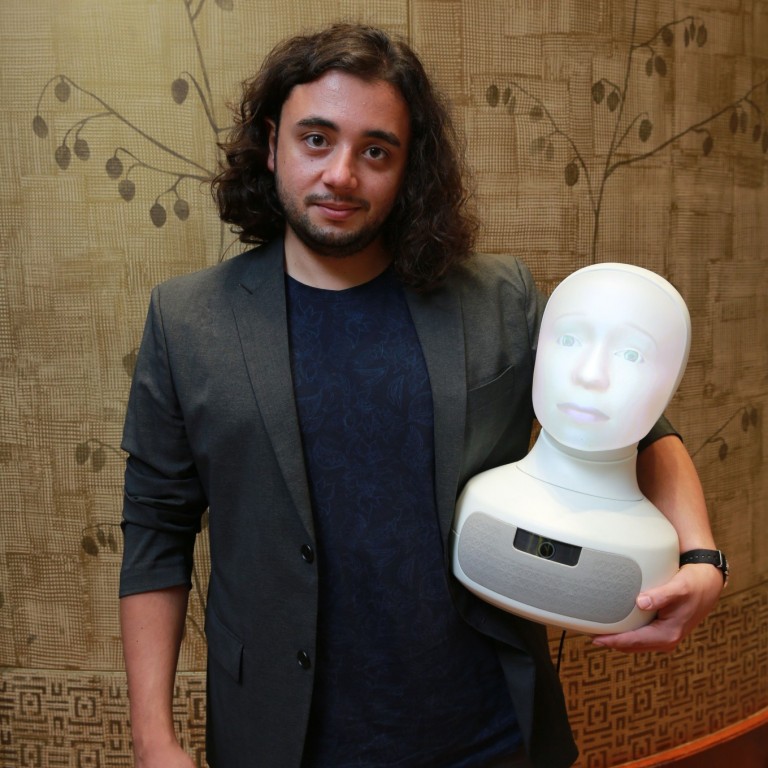
From conducting job interviews to vocational training, Swedish start-up sees robots as a game changer
- Furhat Robotics says there will be hundreds of uses for robots over the next two decades
- Only a few platforms will dominate the robotics industry, similar to Apple and Android in the mobile sector
If the future turns out to be just the way as envisioned by Samer Al Moubayed, robots will become part of our everyday lives, spawning huge business opportunities worth billions of dollars.
The CEO and co-founder of Furhat Robotics, a Swedish start-up developing robotic applications, says there could be hundreds of uses for robots, from conducting job interviews to vocational training to customer servicing worth billions of dollars in the next two decades. These robots will become so common that they will be used in schools, offices, hospitals and malls.
“If an application can accommodate a million robots, there is a market,” he said in an interview on the sidelines of the Forbes Under 30 Summit Asia in Hong Kong last week.
“There will be hundreds of applications, each larger than US$1 billion … in 20, 30 years, there will be millions of [service] robots everywhere doing different things, but it is likely only one to three platforms will dominate [similar to] Apple and Android.”
Development of human-like robots began a few years before Stockholm-based Furhat was set up in 2014, when Al Moubayed was pursuing a PhD at the city’s KTH Royal Institute of Technology in speech technology.
The company last November launched its pilot robot, which features changeable masks onto which customised facial animation – based on age, gender, ethnicity and look – can be projected.
It also has real-time camera tracking systems to follow the person with whom the robot is communicating, to tilt its head and maintain eye contact.
Meet ‘Rehabao’, the smiling robot that helps Hong Kong’s elderly patients recover from stroke
The product has been well received and Furhat has a two-month order backlog, Al Moubayed said, adding its “humble” workshop in Stockholm is ramping up production capacity from 20 per units per month currently to 50 by October and 100 by January.
“We are still in the market testing phase,” he said. “Development of the whole social robots industry is super early; the main use of the robots at this stage is really for the developers to create applications.”
Furhat provides robot development kits to both small agencies with 10 to 15 application developers, and large multinational information technology consultancies like Capgemini and Accenture.
The firm has struck six partnerships, including one with Swedish recruitment agency TNG to launch “the world’s first unbiased” job-interview robot, and with transport operators in Frankfurt and Tokyo to deploy the robots to provide directions at train stations and airports.
Other applications are being piloted in psychotherapist job training, disease pre-screening, elderly care, entertainment and education settings.
Furhat has raised US$7 million since its inception, including US$2.5 million from venture capital firms Balderton Capital and LocalGlobe in 2017 and €2.3 million (US$2.58 million) from the European Innovation Council in March this year.
It will raise more money “soon” and is looking to collaborate with “strong” Asian investors to help its expansion in the region, Al Moubayed said, adding it plans to double its headcount of 35 by early next year.
While in Hong Kong, he met potential customers and partners through telecoms operator HKT’s enterprise solutions unit and Hong Kong Productivity Council.
Other companies in the service robots industry include four year-old California-based Cloudminds Technology, which aims to form partnerships to put 100,000 units – including human-like ones – in the market by the end of 2021.
Invento Robotics, based in the southern Indian tech hub of Bangalore, is also developing service robots with capabilities to assess customers’ age, gender and emotions, and engage in conversations with them.

